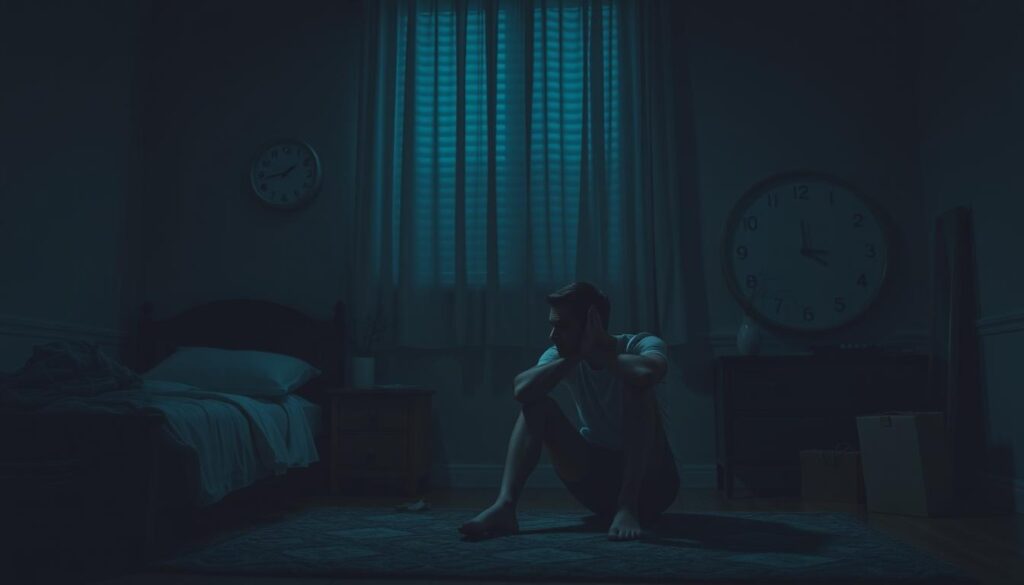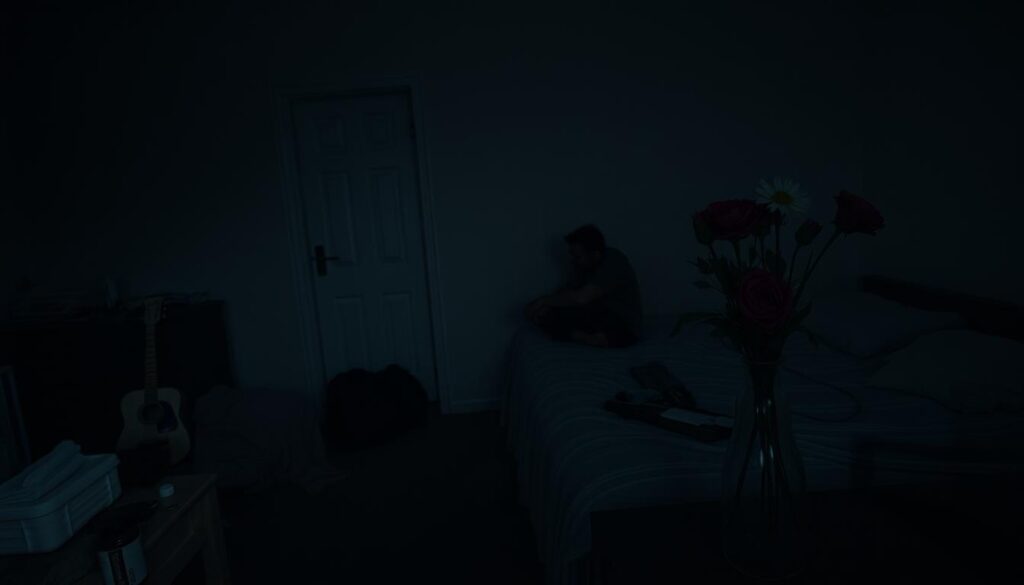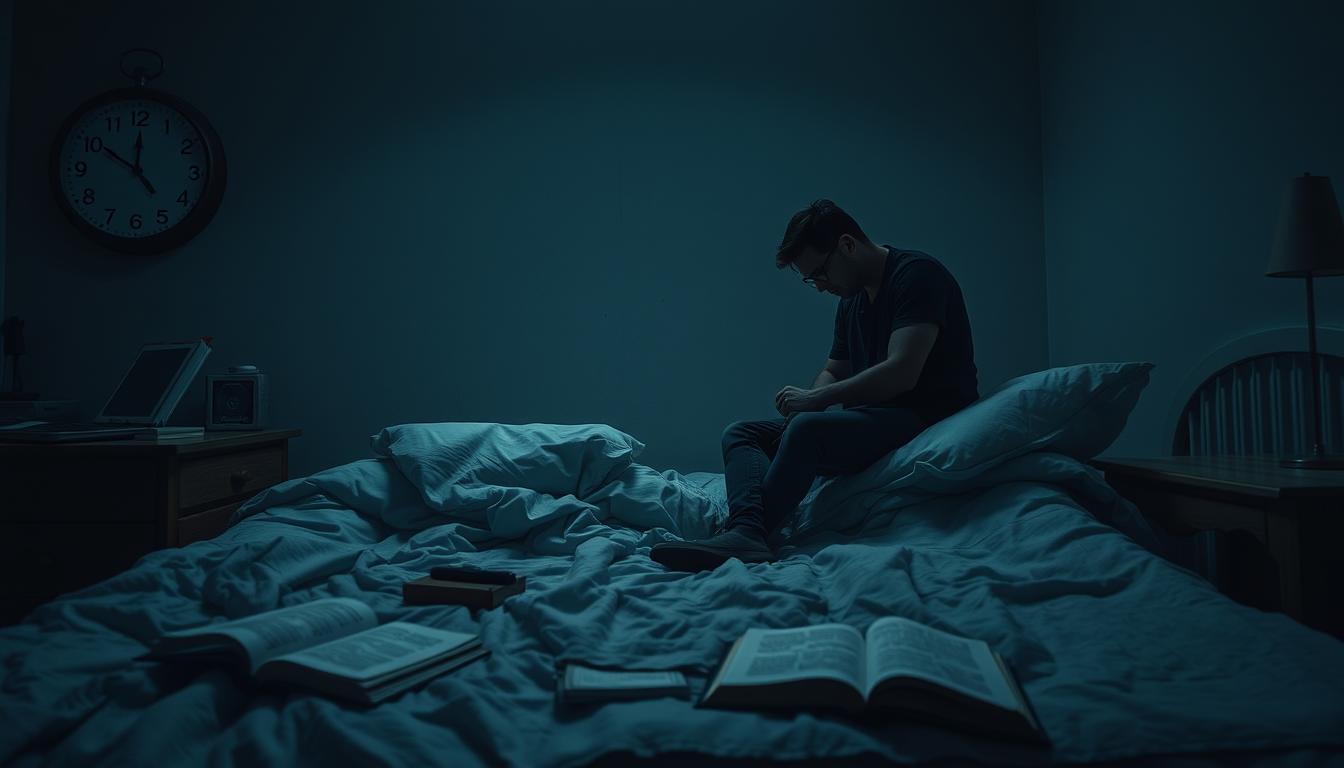It’s key to know the signs of Low Male Libido Symptoms for their health and happiness. This topic is delicate but vital. It’s about spotting the signs that can change how we feel and our relationships.
Things like mental health, hormone levels, and how we live can lower our desire for sex. Knowing these signs helps men take action. It’s the first step to finding the cause and getting help.
This way, men can work on their health and enjoy better relationships. It’s all about recognizing the signs and taking steps to improve.
Introduction to Low Male Libido
Low male libido can be a worrying issue. But, it’s important to know that changing sexual desire is normal. Knowing the signs and causes can help solve this problem.

Understanding Low Libido
Low libido means men have less sexual desire. This can happen for many reasons like relationship problems, stress, or health issues. Decreased sexual desire in men might just be a short-term thing or a bigger issue. It’s key to know the difference to find the right solution.
Importance of Awareness
Being aware is crucial in dealing with low libido. Knowing the signs helps men get medical help when needed. Learning about male sexuality and its natural changes helps keep a positive view of sexual health.
Common Symptoms of Decreased Libido in Males

It’s important to know the signs of low libido in men. This issue can affect both physical and emotional health. It can also strain relationships.
Physical Symptoms
Men with low libido might notice a drop in sexual interest. They might also face erectile dysfunction or trouble reaching orgasm. Low testosterone, due to aging or illness, is another common cause.
For more on why this happens, like from medication or low self-esteem, check out this article.
Emotional Symptoms
Feeling distant from your partner and feeling inadequate are emotional signs. Stress and low self-esteem often go hand in hand with these feelings. Spotting these signs early can help find the right help.
Depression and Low Libido: Connection in Males
Studies show a strong link between depression low libido in men, affecting mood and sexual desire. It’s key to understand this connection to better manage symptoms and improve well-being.

How Depression Affects Libido
Depression can harm libido by changing brain chemistry. It lowers serotonin and dopamine, key for mood and sexual desire. This imbalance makes it hard to feel excited about sex.
Depression also brings heavy emotions like sadness and worthlessness. These feelings drain energy needed for sex.
Identifying Symptoms
Spotting depression symptoms linked to low libido is important. These signs include:
- Persistent sadness or emptiness
- Loss of interest in activities, including sex
- Chronic fatigue or lack of energy
- Difficulty concentrating
- Changes in appetite or weight
- Sleep disturbances
The table below shows key signs of depression low libido:
| Depression Symptoms | Impact on Libido |
|---|---|
| Persistent Sadness | Decreased interest in sex |
| Fatigue | Reduced energy for sexual activity |
| Loss of Interest | Lack of sexual desire |
| Cognitive Distraction | Difficulties in sexual concentration |
Fixing depression low libido needs a mix of therapy, meds, and lifestyle changes. It’s crucial to get professional help to tackle these issues together.
Impact of Stress on Male Libido
It’s important to understand how stress and libido are connected. Stress can take many forms and affect male libido. Managing stress well can lead to better sexual health and overall happiness.
Types of Stress
Stress can be different, and it all impacts male libido. Here are some common types:
- Occupational Stress: Work that’s too hard, tight deadlines, and long hours can cause chronic stress. This can lower libido.
- Personal Stress: Problems like relationship issues, money troubles, and family duties can make personal life tough. This can also lower sexual desire.
- Chronic Stress: Ongoing stress can cause hormonal imbalances. This can make libido even lower.
Managing Stress
There are ways to reduce stress and improve libido. Here are some tips from wellness experts:
- Mindfulness Meditation: This can help reduce anxiety and improve mental health.
- Regular Exercise: Exercise is great for reducing stress and boosting mood.
- Healthy Diet: Eating well supports health, including sexual function.
- Adequate Sleep: Good sleep helps the body recover and lowers stress.
- Relaxation Techniques: Activities like yoga and deep breathing can help relax and reduce stress.
Mindfulness meditation is a simple yet powerful way to relieve stress and improve male libido. – Jon Kabat-Zinn
By using these stress reduction techniques daily, men can find a better balance. This can lead to healthier and more fulfilling intimate relationships.
Hormonal Imbalances and Symptoms
Understanding hormonal imbalances is key to addressing symptoms of low male libido. Testosterone is a vital hormone for male sexual health and well-being. Disruptions in testosterone levels can lead to notable changes in libido and other health issues.
Key Hormones Involved
Testosterone is the primary hormone associated with male libido. It plays a crucial role in promoting sexual desire, performance, and reproductive function. Low testosterone levels can lead to decreased libido, fatigue, and mood disturbances. Other hormones such as estrogen and prolactin can also influence male sexual health when imbalanced.
Diagnosis and Treatment
Diagnosing a hormonal imbalance involves comprehensive blood tests to evaluate testosterone levels and other relevant hormones. Endocrinologists typically conduct these tests to identify precise deficiencies or excesses. Treatments for hormonal imbalances range from hormone replacement therapy (HRT) to lifestyle modifications such as diet, exercise, and stress management.
In cases where testosterone levels are significantly low, physicians may recommend HRT. This involves the administration of synthetic testosterone to restore normal levels. It’s essential to monitor this therapy closely to avoid adverse effects.
Additionally, lifestyle changes play a critical role in managing hormonal imbalances. Regular physical activity, balanced nutrition, and adequate sleep all contribute to maintaining optimal hormone levels. This improves libido and overall health.
Thyroid Issues Leading to Low Libido in Men
Thyroid problems can really affect a man’s sex drive. It’s important to know how thyroid issues like hypothyroidism and hyperthyroidism impact sex health. The thyroid gland controls hormones, which can change a man’s libido. So, it’s key to spot and treat these problems early.
Hypothyroidism Symptoms
Hypothyroidism means the thyroid gland doesn’t work right. Men with this condition often feel tired, gain weight, and get depressed. These symptoms can make a man less interested in sex.
- Fatigue and low energy: Not enough thyroid hormone makes you feel very tired, which can lower your sex drive.
- Weight gain: Being overweight can hurt your self-esteem and make you feel less sexy.
- Depression: Feeling down because of thyroid problems can also make you less interested in sex.
Hyperthyroidism Symptoms
Hyperthyroidism, or an overactive thyroid, also affects sex drive but in different ways. Symptoms like anxiety, feeling restless, and losing weight too fast can stress you out. This stress can hurt your sex life.
- Anxiety and restlessness: Too much thyroid hormone can make you feel anxious and restless, which can lower your libido.
- Unwanted weight loss: Losing weight too fast can make you feel unwell and affect your confidence, which can hurt your sex life.
- Sleep disturbances: Not sleeping well can make you tired and less interested in sex.
Both hypothyroidism and hyperthyroidism can make it hard to feel like having sex. Getting a diagnosis and treating it right is important for your sex life and overall health.
| Condition | Common Symptoms | Impact on Libido |
|---|---|---|
| Hypothyroidism | Fatigue, weight gain, depression | Decreased sexual desire |
| Hyperthyroidism | Anxiety, weight loss, sleep issues | Lowered libido due to stress and restlessness |
Medications Affecting Male Libido
Medications play a big role in male libido. Some drugs for health issues can lower libido or cause sexual problems. Always talk to your doctor before changing your meds.
Common Medications
Many drugs can affect male libido. Here are some common ones:
- Antidepressants (e.g., SSRIs like fluoxetine and sertraline)
- Antihypertensives (e.g., beta-blockers like propranolol and metoprolol)
- Finasteride (used for treating enlarged prostate and hair loss)
- Antipsychotics (e.g., risperidone and haloperidol)
- Opioids (e.g., oxycodone and morphine)
Potential Side Effects
Side effects of these drugs can be different. But, common sexual problems include:
- Reduced libido
- Erectile dysfunction
- Delayed ejaculation
- Difficulty achieving orgasm
It’s important to think about the good and bad of these drugs on libido.
| Medication | Primary Use | Potential Side Effects on Libido |
|---|---|---|
| Fluoxetine | Antidepressant | Reduced libido, delayed ejaculation |
| Propranolol | Antihypertensive | Decreased sexual interest |
| Finasteride | Prostate treatment | Decreased libido, difficulty achieving orgasm |
| Risperidone | Antipsychotic | Erectile dysfunction, reduced libido |
| Oxycodone | Pain relief | Decreased libido |
Knowing these side effects is key. If you have sexual problems, talk to your doctor. This helps manage your health and libido well.
Signs of Low Libido in Males
Understanding the *behavioral changes* linked to low libido in males is key for healthy relationships. Spotting the signs early can help partners tackle these issues together.
Behavioral Changes
Low libido shows up in different *behavioral changes*. These might include:
- Avoidance of intimate situations.
- Reduced display of affection.
- Increased irritability or frustration.
These signs point to a deeper issue that needs attention. By spotting these signs, couples can start working on the problems together.
Relationship Impacts
A drop in libido can cause big *relationship problems*. It can lead to a gap in physical and emotional connection between partners.
Talking to a relationship counselor can offer great insights. They can teach couples how to keep intimacy alive and improve communication. This is crucial for overcoming relationship hurdles.
Age-Related Libido Changes
As men get older, their sex drive often decreases. This change is linked to libido aging and sexual health over time. Some men notice this more, while others stay interested in sex as they age. Knowing this can help figure out if it’s just age or something more serious.
Many things affect libido with age. Hormonal changes, like lower testosterone, and stress are big factors. Physical issues and lifestyle choices also play a part. Diet, exercise, and sleep are key to keeping sexual health up.
It’s important to find out why sex drive might be down. The Mayo Clinic says seeing a doctor can help. They might suggest therapy, changing medications, or improving sleep.
- Mental Health: Addressing depression and stress can significantly impact your libido.
- Medical Conditions: Identifying and treating health issues like obstructive sleep apnea may help.
- Lifestyle Choices: Incorporating regular exercise and a balanced diet promotes better sexual health over time.
Libido changes with age, but they’re not the same for everyone. Your experience is shaped by genetics, lifestyle, and health. Talking to a healthcare provider helps tailor a plan that fits your needs as you age.
Diet and Lifestyle Factors
Keeping a balanced and healthy lifestyle can really boost male libido. Eating the right foods and making smart lifestyle choices can help a lot. This can make sex better and improve your overall health.
Nutrients Impacting Libido
Some nutrients are key for sexual health. Eating foods rich in these vitamins and minerals can naturally increase libido.
- Zinc: Important for testosterone production, found in foods like oysters, beef, and pumpkin seeds.
- Vitamin D: Supports hormonal balance, available in dairy products, fatty fish, and sunlight exposure.
- L-arginine: An amino acid that improves blood flow, present in nuts, seeds, and beans.
Lifestyle Choices
Healthy lifestyle choices are key for keeping libido high. Making positive changes in your daily life can greatly benefit your sex life.
- Exercise Regularly: Physical activity can enhance blood flow and increase energy levels, contributing to a higher libido.
- Manage Stress: Practice relaxation techniques such as yoga or meditation to reduce stress and improve overall well-being.
- Avoid Excessive Alcohol: Lower alcohol consumption to prevent negative impacts on sexual performance.
- Get Enough Sleep: A good night’s sleep is essential for hormonal regulation and general health.
| Healthy Lifestyle Choices | Benefits |
|---|---|
| Regular Exercise | Increases blood flow, enhances mood |
| Balanced Diet | Provides essential nutrients, supports hormonal balance |
| Stress Management | Reduces mental fatigue, improves libido |
| Quality Sleep | Regulates hormones, boosts overall health |
By following a libido-boosting diet and making healthy lifestyle choices, you can greatly improve your sex life. This can also make you feel better overall.
Psychological Causes of Low Libido
It’s important to understand why low libido happens. Mental health issues like anxiety, stress, and past traumas can affect libido. These problems can harm a person’s well-being, so it’s key to tackle them.
Stress or past traumas can lower libido. Getting help from mental health professionals can help face these issues. Knowing about these causes helps people find the right therapy.
Anxiety can make someone worry too much, making sex less appealing. Past traumas can also make people shy away from intimacy. Therapy can help overcome these problems and boost libido.
Here’s a look at common psychological factors that affect libido and what therapy can do:
| Psychological Factor | Impact on Libido | Suggested Therapy |
|---|---|---|
| Anxiety | Decreased interest in sexual activities | Cognitive Behavioral Therapy (CBT) |
| Chronic Stress | Reduction in sexual desire | Stress Management Techniques |
| Past Traumas | Aversion to intimacy | Trauma-Focused Therapy |
Seeing the link between mental health and libido is crucial. If you’re struggling, don’t be afraid to get help. Therapy can help manage symptoms and improve sexual health.
So, understanding and dealing with these psychological causes is essential. It helps improve mental health libido and ensures a fulfilling intimate life.
Medical Conditions Linked to Low Libido
It’s important to understand how different health issues can affect our libido. This part talks about how cardiovascular diseases and diabetes can lower our desire for sex.
Cardiovascular Diseases
Heart problems can make it hard for both men and women to feel like having sex. This is because poor blood flow hinders sexual function. It’s key to tackle these heart issues to boost our sex drive.
Studies show that by changing our lifestyle and taking medicine, we can improve blood flow. This can help increase our libido.
To learn more about how health issues affect our libido, check out health conditions low libido.
Diabetes
Diabetes can also cause sexual problems, including low libido. High blood sugar can harm blood vessels and nerves. This makes it hard to keep up with sexual health.
By controlling diabetes with diet, exercise, and medicine, we can reduce these sexual issues. This might even help us regain our libido.
It’s crucial to understand how diabetes affects our sex life. With the right medical care and lifestyle changes, we can improve our quality of life.
These points highlight the need to tackle underlying health issues to boost libido. Working on cardiovascular diseases and diabetes is essential for better sex life and overall health.
Importance of Open Communication
Talking openly about sexual health is key to solving low libido issues. It’s important to have clear talks with your partner and get expert advice. This way, both of you are in the loop and working together to find a solution.
Talking to Your Partner
Talking about libido with your partner is vital for understanding and support. Good communication strengthens your relationship. It lets you both share feelings and expectations openly.
Being honest and open helps create a supportive space. This makes it easier to find solutions together.
Consulting a Healthcare Provider
Getting professional help for libido concerns is a big step. Doctors and sex therapists can offer personalized advice. They help based on a full check-up of your situation.
They focus on both your physical and emotional health. This ensures you get the right treatment for your needs.
By focusing on open talks and expert advice, couples can tackle sexual health issues. This leads to better well-being and closeness.
Natural Remedies and Supplements
Learning about natural remedies and supplements is key for those wanting to boost their libido. This is especially true for those who don’t want to use medicines.
Herbal Supplements
Herbal supplements are known for their ability to naturally boost libido. Some of the most popular ones include:
- Maca Root: It’s famous for increasing sexual desire, making it a top choice for natural libido boosters.
- Ginseng: This herb is loved for its energy-boosting effects, which helps in enhancing libido.
- Tribulus Terrestris: It’s often used to raise testosterone levels, making it a common ingredient in libido supplements.
Lifestyle Adjustments
Making lifestyle changes is crucial for maintaining a healthy libido. Here are some adjustments to consider:
- Diet: Eat foods high in vitamins and minerals like zinc and vitamin E, which support sexual health.
- Exercise: Regular exercise improves blood flow, boosts energy, and can greatly enhance libido.
- Sleep: Getting enough sleep is important, as lack of rest can harm sexual desire.
- Stress Management: Try meditation, yoga, or other activities to reduce stress and keep your libido healthy.
Natural libido boosters, like herbal supplements and lifestyle changes, offer safe alternatives for improving sexual health. By using these methods, people can see significant improvements in their well-being and libido.
Professional Treatments Available
Men with low libido can find help through professional treatments. It’s important to know about medical treatments for libido to choose the right one.
Hormone Replacement Therapy (HRT)
Hormone Replacement Therapy (HRT) is a key treatment for low libido caused by hormonal imbalances. It can raise testosterone levels, improving sexual function. But, it’s crucial to talk to a doctor first because HRT can cause mood swings and heart problems.
Psychotherapy and Counseling
Sexual health therapy includes counseling for mental issues that lower libido. Experts in this field help patients deal with stress, anxiety, and relationship issues. This can greatly improve mental and sexual health.
“Open communication with a healthcare provider is key to discovering the most effective treatment for low libido,” notes Dr. Alicia Stanton, a well-known endocrinologist.
Medicated Solutions
There are also medicines to help with libido, like drugs that improve blood flow or balance brain chemicals. These can be helpful but need a doctor’s care because of possible side effects.
Comparative Analysis of Professional Treatments
| Treatment Method | Indications | Benefits | Potential Pitfalls |
|---|---|---|---|
| Hormone Replacement Therapy | Low testosterone levels | Improved energy, libido | Cardiovascular risks, mood changes |
| Psychotherapy and Counseling | Psychological issues | Enhanced emotional well-being | Time-intensive, requires commitment |
| Medicated Solutions | Various symptoms | Targeted symptom relief | Side effects, dependency risks |
Choosing the right treatment means understanding all options in sexual health therapy. A tailored approach is safest and most effective, leading to lasting sexual health improvements.
Conclusion
It’s important to notice and tackle low male libido to keep health and happiness in check. This article explored many sides of the issue. It looked at physical and emotional signs, stress, hormone problems, and other health issues.
Men can take steps to boost their sex life. Managing stress, fixing hormone levels, and choosing healthy foods and habits help a lot. Also, talking openly with partners and doctors can lead to good treatments.
Beating low libido needs awareness, taking care of oneself, and getting help when needed. By using these tips and seeking help, men can live better and enjoy their intimate life more.






